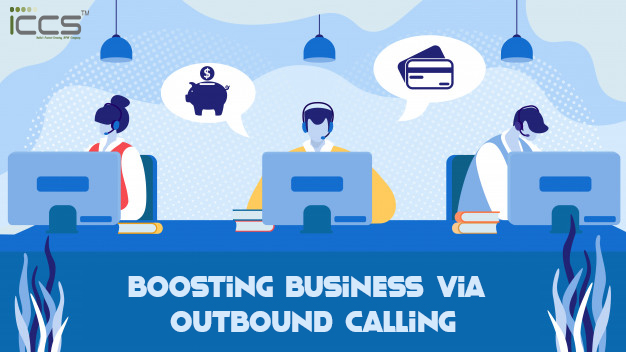Boosting Business via Outbound Calling
Posted by ICCS BPO on Monday 24th of February 2020
Outbound calling is direct line of communication with the customer and ensures that company’s objectives are met authentically. It has become more efficient with Cloud Telephony. It has resulted in emergence of several OB calling strategies to save time and resources. A lot of businesses, prefer to use inbound calling method to accelerate their performance.
Outbound Call vs Inbound Call
Inbound call is the one which comes in from an external source and is exact opposite of an outbound call. Customers place a call to ask about a product/service or to simply know the status of their association with the company. A lot of businesses find outbound calling to be a better option while many others consider inbound calls to be more profitable. For best results fair mixture of inbound-outbound calls is preferable. Both calling strategies are complementary. It facilitates business to business (B2B) and business to customer (B2C) contact and gives a platform on whose basis a long-term relationship can be forged.

Way to Succeed in Outbound Calling
An efficient outbound calling strategy needs to be devised to ensure that calling campaign is successful. They are as follows:
- Defining Goals: Goals of an outbound calling needs to be defined in detail. What is the objective of campaign? Is it to boost sales, conduct surveys, market products or is it to simply undertake outbound calling for lead generation? Who is target audience? Is it going to be B2B (business-to-business) or B2C (business-to-consumer) interaction?
If it is going to be B2B then are the agents aware of what is B2B outbound calling? If it is B2C, what is the exact profile of the consumers one is aiming to connect with? With a pre-defined strategy, further processes can be effectively planned and executed.
- Key Performance Indicators (KPI’s): Key performance indicators is an important tool to measure the success or failure of a calling strategy. These indicator may include pointers like occupancy rate, hit rate and calls per agent, conversion rate and average call handling time, call quality analysis & abandoned calls.
- Training: Associates are the first point of contact for a customer and they make or break customer’s impression & ensures long-term customer association. So it must be ensured that the agents are well trained to be patient, adaptable, quick, attentive and responsive with the required information. Incentives can be provided to motivate agents to ensure they put their abilities to the best use.
Soft skills to ensure effective call:-
- Attentiveness: Agent must ensure to grab the client’s attention, because if the interest of the customer doesn’t pique, he/she would simply hang up. Personalization mixed with empathy, followed by offering a product/service that can resolve their issue or help make their life better.
- Confidence: Confidence is the key that can help an agent gain customer’s trust. Agent must research product extensively and how it relates to customer in a beneficial manner prior to making an actual call. It is both an instant confidence booster and a trust gainer.
- Offering Value: While speaking to a potential customer, finding about their requirements in advance helps in making the conversation worthwhile both for consumer and seller.
- Value Time: Before launching into the sales pitch, always ask the customer if it is a good time to speak with them and if consumer gives negative revert then schedule a call as per consumer’s convenience. Valuing customer’s time is a great way to build good connections.
- Active Listening: Listening is the most important part of good communication. It is essential to listen properly as it would help avoid presumptive questions and would encourage meaningful conversations and fruitful results.
- Avoid False Commitment: Agents often tend to make unrealistic commitments in flow of conversation. And if a promise is made and not kept, then the customer’s trust is lost forever. So agent should be doubly sure before committing anything to customer.
- Rigorous Follow Up: End the call with a specific time to follow up. Avoid settling for a “sometime next week”. Instead, ask the customer for a fixed time. This helps in ending the conversation on a good note and keep the prospect interested. It also displays professionalism.
A consistent tracking and measuring of performance through call quality analysis and CRM software is a must.
Latest Technology: A constant evaluation and upgradation of the technical tools being employed go a long way in bolstering the effectiveness of an outbound calling strategy.
A business must make sure that the software it deploys rightly represents their dialling requirements. Care should be taken to see that it integrates seamlessly with CRM so that the data obtained can be safely stored.
All of the above pointers ensure that outbound calling results in business achieving its targets and good growth for business.
